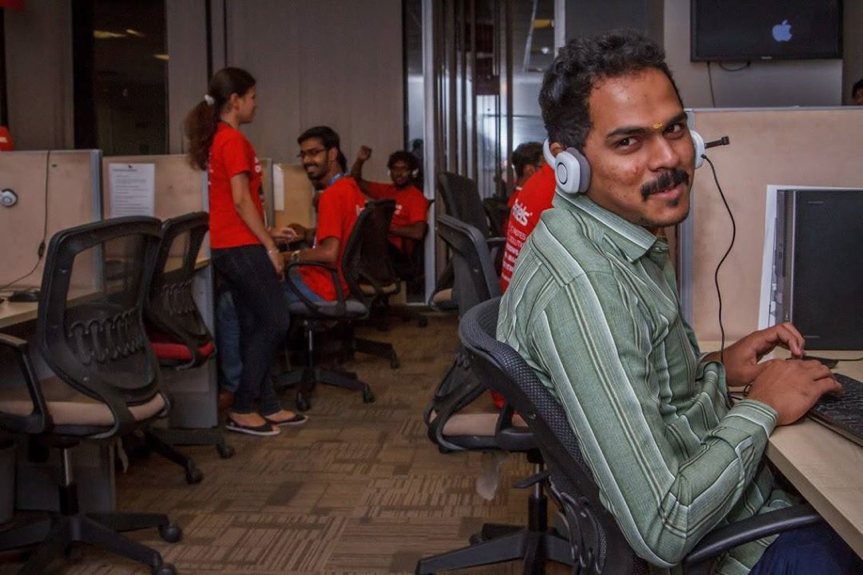Features of work in an international team. India

There are once Indian, Japanese and Russian ... It sounds like the beginning of a bearded anecdote. In fact, everything is much closer to life than it might seem at first glance. Probably many people know that Parallels is an international company with an international team. Today we have 13 offices around the world. And if the development is concentrated mainly in Russia, Estonia and Malta, sales in North America and Europe, then technical support is distributed among several countries at once. Under the cut a story about how our support gurus live and work.
Parallels call center is available 24 hours a day, 7 days a week. The company's engineers process about 400 calls per day.
The structure of the call center is quite complex and geographically distributed. Technical support engineers are located in several countries at once (India, China, Malta, Russia) and are divided linearly.
- The first line is the operators dealing with general issues.
- The second line - experts with deep technical knowledge of products
- The third line is a bunch of technical support specialists and product developers.
Operators of the first and second lines are divided into teams, each of which specializes in supporting its own Parallels product (we have seven ). In addition, the operators are divided into groups according to the criterion of language proficiency: there are several language lines in the Parallels call center.
Despite this seemingly complicated structure, the software solutions used successfully cope with call routing. For the correct distribution of requests, options for constructing complex IVR scripts are used.
Now the interactive system works as follows: the client logs into his account on my.parallels.com, passes authorization, then specifies the reason for treatment, or enters the number of an existing application. This takes into account the language line received the appeal. As a result, the client immediately goes to the desired operator, who, in turn, at the time of the request, receives all the relevant information about the client.
Chennai - a city of contrasts
Our contact center, serving users from the USA and Europe, is located in the Indian city of Chennai. This is the first line of technical support. She solves up to 90 percent of incoming client requests. The second line of technical support is based in Moscow. These are the so-called “hard cases”. These requests require more serious immersion in problems and interaction with developers within the company.

When you get to Chennai for the first time, you are surprised to find that traffic jams appear after 21.00. Yes, and office life begins to boil in the late afternoon. And it is no wonder. The offices and representative offices of foreign companies located in the city work mainly at night due to the time difference. Our office is no exception.

In India, about 60 people are involved in customer support. These are mostly locals. Work in an international company in the country is considered prestigious. In Parallels are technically trained specialists. Of course, the general level of training differs from Russian engineers, but this is compensated for by hard work, customer focus, and understandable English.

Among the cultural features I want to note the hospitality, smile and positive attitude of the Aborigines. And the local team loves corporate merch. T-shirts and anti-stress every time diverge with a bang.
In fact, over the years of collaboration with colleagues from the country of yoga and white lotuses, a lot of life hacks have accumulated to work with them. I would like to share some of them.
1. Communicate through the boss.It often happened that you communicate with a colleague, you ask to do something, you hear confidently - Yes, but nothing happens. And it can last indefinitely. Then it turns out that on your request the horse did not roll. In this case, Indians do not particularly rush to share their objections with you. They just have such a culture - never say no. Another point, it concerns the respect of the hierarchy. In the country, it is not customary to act "over the head" of the boss. Even if you have said something to someone or asked to do it, without the approval of the supervisor, nothing will move. However, if he gave someone an order, everything will spin at the same moment. Discussions about the correctness or inaccuracy of the command given will also not be. Under the visor and run at the pace of a scalded cat to perform.
2Give clear instructions and set specific deadlines. Try to never let the Indians think out how to do better. Otherwise, the work will never be done. If you hear the phrase "We will try," most likely it is a subtle hint of "no." Try to delicately determine the dates and the final result. It is better to back up the arrangements with correspondence so that the memory does not fail at the crucial moment. Alas, micromanagement is what gives really brilliant results here.
3. Do not wait for revelations. So here it is accepted that regardless of the attitude towards you, everyone will be polite and courteous. Nobody will send you an erotic journey on foot and cut the “truth-uterus” directly into your eyes. It’s another thing that they don’t hurry to unwind the turban.
four.Everyone loves gifts. Not rarely you can be invited. This is considered a show of respect. So from your visit they often wait for gifts. It does not matter how much a gift costs, but its presence is conducive to further communication and the establishment of trusting relationships. Stock up on nice little things.
5. Talk. It is actually amazing how curious Indians are. All these inquiries about family, children, and health can be shocking at first. Then you realize that this is part of the culture. And if here you demonstrate a certain openness, in the future it helps you to work with them.
6. Set standards of service and maintenance immediately.In India, people are accustomed to the aggressive style of sales, so that for a European or Latino will be unacceptable and considered to be rude, for the Indian - in the order of things. Apparently, they are learning to bargain from early childhood, and this skill is well pumped from all. The clearer the client communication script is described, the more predictable the result will be. Especially when it comes to tech support.
7. Monitor analytics. There was a case when the first line of technical support was sprinkled with customer calls. After updating our software, one of the features stopped working correctly. So, despite the increased load, technical support did not inform the developers about the problems that had arisen until we ourselves paid attention to it.
8. Be polite.It is necessary to take into account that Indians are very susceptible people. Any correspondence with kapslok, F *** and excessive rudeness can demoralize the local Aboriginal people and stop work.
Share in the comments your experience in an international team. Perhaps you also noticed something described above and found your own life hacking. Also, if the topic seemed interesting to you, we can tell you about the features of work, for example, in Japan.
ZY By the way, if you are interested in the work of a technical support engineer in Parallels, please respond here or write to staff@parallels.com.

